- Home
- Rosanne Hawke
Spirit of a Mountain Wolf Page 6
Spirit of a Mountain Wolf Read online
Page 6
Razaq followed the boy across two roads, jumping between vehicles. Cars screeched, horns tooted and yet, surprisingly, this time no one seemed angry.
“I do this all the time,” the boy said when they reached the side of Iqbal Road. “Where do you want to go?”
Razaq hesitated, then thought it couldn’t hurt to say. “Moti Bazaar.”
“Then you have to cross Iqbal Road as well—the bazaar is over there.”
Razaq sighed. He had done it by himself when he rescued the buffalo; he could do it again. “Shukriya,” he said.
“You’re not from here, are you?”
Razaq glanced at the boy in surprise.
“Be careful. I know you are alone—you have that look. Others will see it, too, so watch your eyes. My name is Zakim. I live here on the street.”
“Here?”
Zakim made a curious gesture with his eyebrows and nose. “I have a place. If you need help, ask for me.”
Razaq stared at him. How could Zakim help him—he only looked about fourteen, like himself. “I am looking for my uncle, Javaid Khan,” he said, to show he didn’t need help.
“Accha, good. God go with you then.”
Razaq smiled his thanks and plunged into Iqbal Road. He had learned something from Zakim: you just ran across without looking, like swinging in a basket across a mountain stream, and God let the traffic stop for you. When he reached the other side, he stood there panting, but Zakim was nowhere to be seen. He grinned. It had been exhilarating with Zakim. In that moment, he felt hope uncurl in his belly. He would find Uncle Javaid. He just had to ask in all the shops in Moti Bazaar even if it took all day.
He found an iron archway. There were words on top. He sounded them out to himself. There was a meem first: M-O-T-I. Yes, he was where he was meant to be. He sauntered down the gali. Shops lined the tiny street and there was a covering overhead. It was like walking down a tunnel of trees in the forest.
He asked for Javaid Khan at the first cloth shop. The man there waved him away; he was too busy even to open his mouth. At the tenth shop, the man came out to the gali with him. “Look,” he said and pointed up the gali. “Can you see the end of this bazaar?”
Razaq gave a slight shake of his head.
“And not only does it stretch so far you cannot see its end, there are many side streets. It will be Eid before you can visit each one. You need the name of the shop or the name of the owner. Does your uncle own it?”
“I do not know.” Razaq’s voice was quiet.
The man pursed his mouth. “You will just be chasing your tail.” He looked Razaq up and down. “From up north, are you? From the earthquake?”
“Ji, janab.”
“If you get a problem, you can come back here and sleep outside my shop until you find him.”
Razaq opened his mouth to thank him, but the man went on. “You can be my chowkidar. In return I will give you an evening meal.”
Razaq wasn’t sure what sort of chowkidar he would be. What if thieves came and beat him while he was protecting the shop? But he had saved Mrs. Daud’s tent, though that was mainly due to Abdul and Hussain turning up. Still, a job was a job.
“Thank you, janab,” he said.
“What is your name, beta?”
“Razaq.”
“You are a khan, I suppose—all you mountain people are.”
Razaq didn’t answer. It wasn’t true they were all khans, even though his father’s family bore the name. The man didn’t give his name in return, and Razaq didn’t feel he could ask. It wouldn’t be polite. He checked the name of the shop, Deen’s Cloth, before he continued along the gali, asking for his uncle.
There were women everywhere; he’d never seen so many at once except at a wedding. Some didn’t even wear a burqa, and a few girls his age wore tight blue trousers like men and a scarf slung around their necks instead of over their hair. He stared so long at one woman as she walked toward him with her friends that she pinched his face when she reached him. It was something his mother playfully did when she was happy with him.
The woman was very tall with much makeup on her face, and a deep voice. “So what’s a pretty mountain boy like you doing in the city?”
How did she know he was from the mountains? It was as though there was a big sign above his head.
“You need to buy a different hat.” She touched his lambswool pakol. “City boys don’t wear these.” As she moved away, she blew between her fingers at him and winked. Razaq was stunned. He had never known a woman to speak to a boy his age before. Though since he was short and didn’t have a mustache yet, she may have thought he was younger.
He had long stopped counting the shops when he came to one with a TV showing the cricket match in Lahore. Some men were watching the TV while their women fingered the silk cloths. Razaq asked the youngest shop worker if a Javaid Khan worked there. A guarded look came over the young man’s face. Razaq had seen that look before—it meant the man thought he was going to ask for money or food. He steeled himself for what would come next.
“Get lost,” the young man said. “We’ve given enough to kids like you today.”
It was late and Razaq’s stomach rumbled. He made his way back through the warren of shops until he found Deen’s. The man was already eating when Razaq greeted him.
“Find your uncle, beta?”
Razaq gave a tired shake of his head. The man didn’t look sympathetic, but he pushed over a chapatti and moved his bowl of curry closer to Razaq.
“Eat up,” he said. “Chowkidaring is hard work.” He chuckled, but Razaq couldn’t see what was funny.
When the food was gone, the man pulled down the shutters of the shop and laid a mat on the footpath in front. Razaq knew he wouldn’t be a good chowkidar for at least a few hours. When he lay down, he couldn’t keep his eyes open.
He dreamed of his mother. She looked right into his eyes, and he could see the green ringing her black pupils. He had inherited her eyes; his father’s were gray like his sisters’. “Beta, this is not a good job for you,” his mother said. “Wake up. You need to cut the grass for the goats. If your father catches you sleeping, he will beat you. In the village, I am called the mother of Abdur-Razaq, so make me proud of that name, beta. Wake up now or the wolves will find you.”
“Wake up.”
“What?” Razaq opened one eye and sat up suddenly. Someone was shaking him. “Zakim? What are you doing here?”
There were pale lights shining on the walls, sweepers were cleaning the gali, and most of the customers had gone.
Zakim glanced up the bazaar. “We have to get out of here.” He tried to pull Razaq up.
“I am a chowkidar—I cannot leave.”
“Fool. If you’ve been asked to work, it is a lie. Men come here to find lone boys lying outside shops. They will make you a slave. Do you want that?”
Thoughts of Kazim crowded Razaq’s mind, and he jumped to his feet. “Of course not.”
There was the sound of footsteps. A group of men entered the gali from the road.
“They’re coming. Chello, I’ll show you a way out.”
Chapter 8
Zakim led Razaq down a side gali Razaq hadn’t seen that afternoon. The men were close behind. Razaq had the impression of sticks, rough voices, and curses.
“This way,” Zakim shouted. He pushed himself into what looked like a round drainpipe. Razaq hesitated.
“Jaldi ao, quickly! They’ll see you.”
A noise from the gali made Razaq plunge in after him. The drain stank. His mother would have made him wash in the river if he came home stinking like this. He held his breath—the pipe couldn’t last forever. When they finally emerged, they were outside. A breeze ruffled the hair sticking out from under Razaq’s hat and the moon was shining. He could tell Zakim was grinning at him.
“How did you find me?”
Zakim laughed. “I thought I’d better keep an eye on you—a babe among wolves.”
Razaq stiffened.
That was what his mother had said in the dream. Zakim touched Razaq’s cheek lightly, then pinched it harder than the lady in the bazaar had.
“Hey!”
“Do not worry, I like you. They say brides are as beautiful and pale as the moon, but I bet they don’t match mountain boys like you. That is what I will call you—Chandi, after the moon. It’s why I looked for you, in case someone else thought the same. Besides, I’m often patrolling some bazaar or other at night. I never know what I’ll find. Once I found a wallet with a wad of rupees. It kept us fed for a month.”
“Us?”
Zakim regarded him a moment. “I am not alone. You can join us if you like.” He laughed at Razaq’s confused expression. “In the morning you will see, Chandi. Follow me, I’ll show you where you can sleep.”
Razaq didn’t wake until mid-morning. When he opened his eyes, he was shut inside a huge cardboard box. He felt a rush of panic and then he remembered Zakim. Three small children sat cross-legged watching him. He sat up, blinking sleep away. “Where am I?”
“This is the Rag Mahal,” the tallest girl said. She had lost a tooth like his youngest sister, Layla, and when she spoke, she reminded Razaq so strongly of her he winced.
“A palace?” he murmured.
The boy stood up. Razaq tried not to stare at him for he was disfigured: he had no nose, only holes in his face, and his arms were too short and so were his legs.
“My name is Raj,” he said. “This is Hira, she is the youngest, and this is Moti.” His voice was strange: muffled and lisping, as if part of his mouth was missing inside. “Moti is named after the Moti Bazaar because Zakim found her alone there when she was little.”
“But it means pearl,” Moti added with pride.
Razaq studied the gap in her teeth. How long had Zakim been living like this? Six years?
“Why do you have green eyes?” Raj asked. “Are you magic? A genie?” He sounded hopeful.
“I do not think so,” Razaq said. He searched the solemn faces in front of him. “Did Zakim find you all?”
“Of course,” Moti said. “Didn’t he find you?”
“He gives us all a name,” Raj said. “And now we have to show you what to do. We work here.”
Razaq crawled out of the shelter to see what the boy meant. Before him was a mountain of garbage. He had never seen so much rubbish. At home, his mother had made use of most things, and what the goats wouldn’t eat, he had buried.
Moti followed close behind him. “One day we will be rich.”
“Like princes,” Raj added.
Hira took his hand. She looked about four years old. “You do look like the moon,” she said.
Razaq felt his face grow hot. Chandi was going to be an embarrassing nickname. He blew out a breath. “What do you do all day?” he asked.
Moti took his other hand. “We find good rubbish and Zakim sells it. Sprite bottles are the best. But sometimes we just have to pick up paper and rags. Zakim says someone uses them again.” She scrunched up her face.
“Zakim picks up metal scrap,” Raj said.
“Is it dangerous?” Razaq was thinking of accidents with broken glass or the little ones falling off the dump and wasn’t ready for Raj’s answer.
“We just have to watch out for the slavers.”
Razaq looked quickly at him. “The what?”
“The men who want to take us away from Zakim,” Moti said. “They will tell us they have a nice place for us to sleep, but really they want us to be slaves and beg for them. Here we are free. So we watch out for each other. If you see any men, run away.” Razaq let her pull him forward. “Just find nice things to sell,” she went on. “Then we can have tasty khana tonight. Usually we just have chapatti and chai, and boiled potatoes if Zakim is lucky.”
“Ji,” said Hira, “but last night we ate shami kebabs. The meat in them was tasty.”
“They were cold and moldy,” Raj reminded her.
Hira pouted. “I still liked them.”
Moti found Razaq a huge plastic bag, and he soon learned what was salable: soft-drink bottles and jars, rags for car shops. If he brought anything back that couldn’t be sold, Moti looked at him mournfully. He couldn’t stand it. He imagined how he’d feel if he had to find things to sell so Seema and Layla could eat that night and worked so hard he didn’t notice Zakim come up behind him.
“You’ve taken to the scrap yard, I see.”
Razaq spun around. Zakim had a canvas bag over his shoulder and a jacket in his hand. It was green and looked like it belonged to a cricketer.
“This is for you,” he said. “You were shivering in your sleep last night. I found it in Landar Bazaar.”
Razaq didn’t immediately take it so Zakim held it out. “You can pay me later.”
“Shukriya.”
Zakim watched him trying it on, then said, “You must have left quickly from where you were not to take a coat.”
Razaq nodded, not sure how to explain Kazim in the freedom of the morning sun. He took the jacket off and tied it around his waist. Zakim wasn’t smiling today, he noticed. “Is anything the matter?”
Zakim glanced at the children picking up garbage. Moti’s voice carried up the dump, telling them what to do. “I want to keep them safe,” he said.
Razaq was silent with respect.
“But there is someone who doesn’t want that.”
“Who?”
“The bear.”
Razaq stared at him, crinkling his eyes.
“Nasir Ali,” Zakim explained. “He works the other side of the dump. He wants my section, too.”
“He will not treat the children well?”
“No.”
“Then he must be stopped.”
Zakim grunted. “And you have an idea how to do that, mountain boy?”
Razaq thought of his and his father’s rifles buried under the destroyed house. “Do you have a gun?”
Zakim gaped at him. “A gun?”
“It is how we protected our family and herds from wild animals. Everyone in the mountains had one. It was very effective.”
Zakim glanced at the cardboard shelter and back to Razaq. “The bear has a knife.”
“You do not?”
“It is my knife he has.”
“So you have fought before.” It was a statement not a question. “How much is a knife?”
“I know where to get a used one for twenty-five rupees.”
Razaq thought a moment. Did Zakim know how much money he had? He glanced at Moti and Raj, who were cajoling Hira to keep picking up papers, then lifted his chin just as his father did when he had made a decision. He pulled the money out of his pocket.
When he looked up, Zakim was grinning. “I knew I hadn’t picked you up for nothing, Chandi.”
When Zakim returned that evening, he had two knives and dinner in a square plastic box.
“How—” Razaq began.
“Don’t ask, Chandi.” Zakim passed him a knife.
The little children sat in an eager circle around the box of curry, and Zakim handed out chapattis. Razaq suspected his money had paid for the food so how did Zakim get the knives? Zakim saw him watching him and made that curious gesture with his eyebrows and nose. Razaq grinned. He guessed he was never going to find out. He joined in with the others, scooping curry up with pieces of chapatti.
“Just like my mother used to make,” Zakim said with a sigh.
“I say it is not,” Raj said.
Zakim looked at the boy with mock sadness. “You need to use your imagination more, Raj.”
The cardboard shelter had been made with the same care that Razaq’s father had taken when building their house. Part of it was a box that some sort of machine had been sold in, which Zakim had tied together with another box. Over the top were sheets of plastic, then more scraps of cardboard held down with wire.
“Welcome to our palace,” he said and ushered Razaq inside, where he lit a candle.
Moti put the other two and herse
lf to sleep on a cardboard mat at the back of the box. Zakim laid a thin blanket over them then came to sit with Razaq near the opening. He pulled a tube from a small bag.
“What is that?” Razaq asked.
Zakim squeezed something out of the tube onto a piece of dirty cloth and handed it to Razaq. “You sniff it.”
“Why?”
“It makes you feel better. Helps you forget you haven’t eaten or are only a prince of a small part of a rubbish dump. It can even make you feel warm—no need for blankets. Magic.” He grinned.
Razaq frowned. “It is like hashish?”
“Hash is too expensive.”
“In the mountains, men who smoke too much hash cannot fight.”
Zakim lowered the cloth. “What is it you are meaning?”
Razaq ignored the threat in Zakim’s voice. “What if the bear comes tonight? He would finish you off.”
Zakim brought the cloth to his nose. “This will make me forget about him.”
“Then you will not realize when he kills you. I would rather know when I am being killed.” He lowered his voice. “Maybe the two of us can overpower him.”
Zakim shook his head. “He is a bear.”
“Bears still have blood like we do, and it pours out like ours. Even a bear feels pain when a ring is put in its nose.”
Razaq watched Zakim put the cloth away. A gun or a knife was no protection against an earthquake, but the bear surely couldn’t be as strong as the earth in a rage.
Chapter 9
When Javaid arrived home from the tribal areas, Sakina jumped into his arms as soon as he entered the courtyard. “Abu, why were you away so long? I missed you.”
“I missed you too, beti.”
Javaid held her close against him. How good it was to smell her freshly washed hair and feel her vibrancy. Amina laid her hand on his back, and he dropped his head to her shoulder and let out a sob.
“It was bad?” she whispered.
He lifted his head and gave them both a watery smile. “I have brought someone to stay with us.” His voice broke, but he carried on. “She is the only relative I could find alive.”

 Kelsey and the Quest of the Porcelain Doll
Kelsey and the Quest of the Porcelain Doll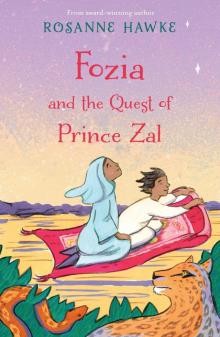 Fozia and the Quest of Prince Zal
Fozia and the Quest of Prince Zal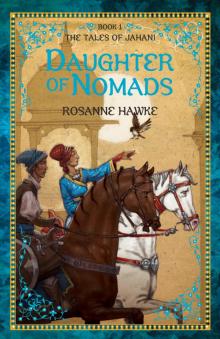 Daughter of Nomads
Daughter of Nomads The Truth About Peacock Blue
The Truth About Peacock Blue Taj and the Great Camel Trek
Taj and the Great Camel Trek The War Within
The War Within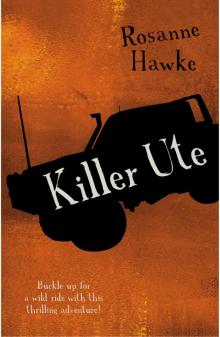 Killer Ute
Killer Ute Shahana
Shahana Kerenza: A New Australian
Kerenza: A New Australian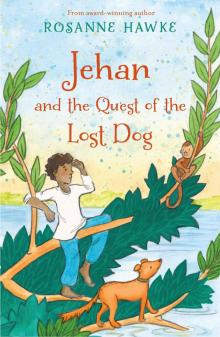 Jehan and the Quest of the Lost Dog
Jehan and the Quest of the Lost Dog Sailmaker
Sailmaker Zenna Dare
Zenna Dare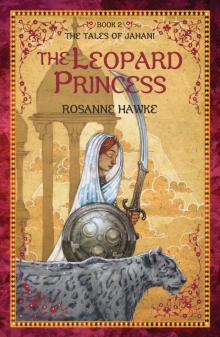 The Leopard Princess
The Leopard Princess Dear Pakistan
Dear Pakistan Marrying Ameera
Marrying Ameera Finding Kerra
Finding Kerra Spirit of a Mountain Wolf
Spirit of a Mountain Wolf